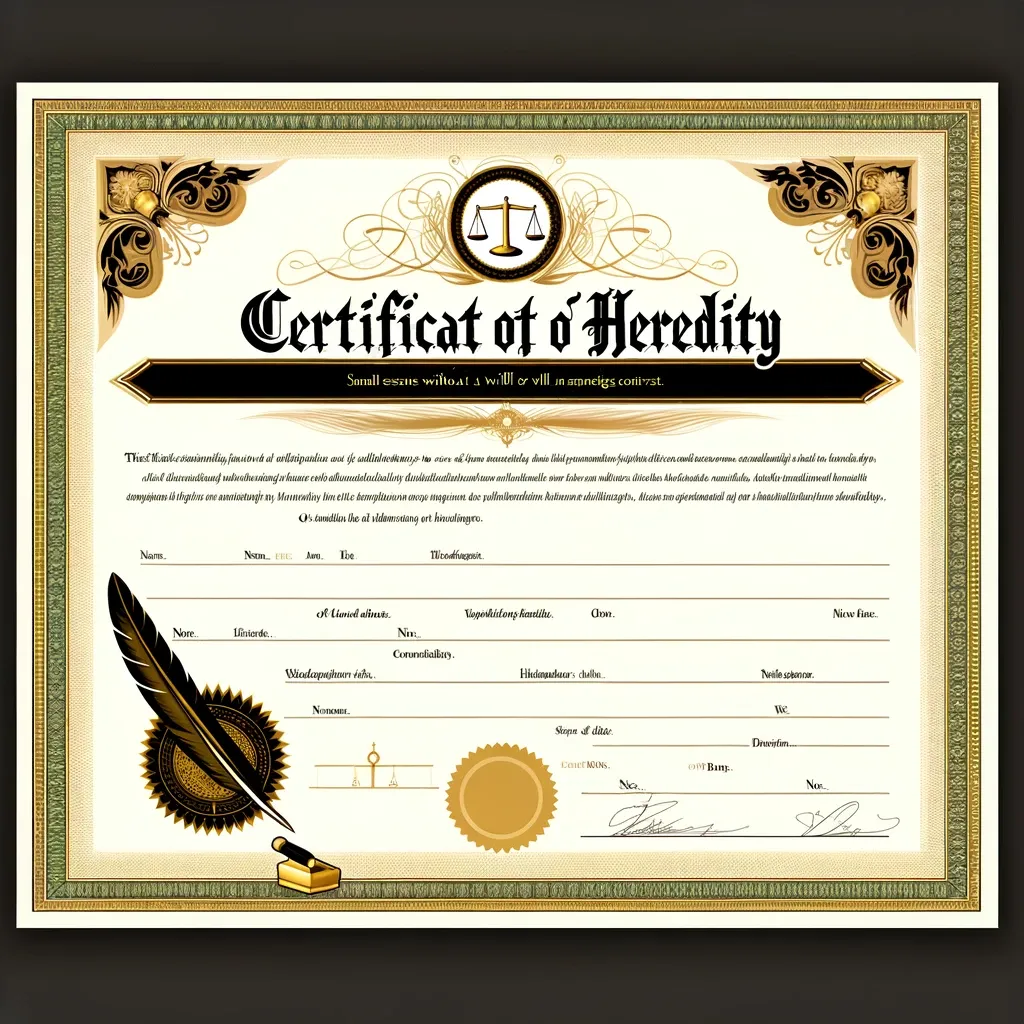"What is a certificate of origin in France and how can it be obtained?"?"

A certificate of inheritance can help partners and family members manage the estate of a deceased person if they did not leave a will, but it is now often replaced by alternatives. A certificate of inheritance is sometimes required for those who did not leave a will. However, this is a matter of agreement, and municipalities have never been legally obligated to provide them. Moreover, in practice, after the introduction of simplified legislation in 2015, many municipalities stopped issuing them. They are applicable only in cases of simple inheritance situations, such as when there is no will or marriage contract, and the amounts are relatively small.
If the city hall cannot provide a certificate, or if you do not want to go that route, there are alternatives. After a person's death, a certificate of inheritance in French can help heirs confirm their relationship to the deceased and simplify official procedures. They can be especially useful in cases where someone dies without leaving a will, having property and only a small amount of savings.
Obtaining a certificate of inheritance, for example, allows the heir to access funds up to a maximum amount of 5,000 euros in the deceased's current or savings account to settle debts or distribute among other heirs. It can also help the surviving spouse receive a widow's pension, a portion of the deceased's pension to which they may be entitled, or widow's benefits for two years if the deceased had a savings account with such attached benefits.
How to obtain a certificate of inheritance?
A certificate of inheritance can be provided free of charge upon proof of the heir's relationship to the deceased - usually this includes descendants, ancestors, collateral descendants, or the surviving spouse. The mayor of the municipality where the deceased was registered at the time of death can issue the certificate, or alternatively, the mayors of the municipalities where the deceased died, or the mayor of the municipality where the heir resides. When requesting the certificate, the heir typically needs to provide the death certificate, the deceased's birth certificate, and proof of their identity (such as a passport). A family book (livret de famille) may also be requested, but this does not apply to many non-civil families. They may also need to provide their own identification, proof of residence, the deceased's parents' family book if they were not married (this does not apply, for example, if they are UK citizens living in the UK), a request form for the certificate, and letters from the deceased's bank (or other institutions) indicating the amounts available for transfer.
14 May 2025
14 May 2025




What rights do unmarried partners of the deceased have?
In France, if one partner dies without leaving a will, and the couple is not married or in a civil partnership recognized in France or an equivalent civil partnership, the deceased's children inherit everything first, followed by the deceased's siblings. If the deceased has no children or siblings, the inheritance goes to the deceased's parents, grandparents, or great-grandparents, unless a will states otherwise.
What should I do if I need to access the funds of a deceased person to cover immediate expenses?
In case of emergencies, an heir can request the release of up to 5,000 euros from the deceased's bank account to cover immediate expenses related to their death, such as funeral costs. In this case, a declaration signed by all heirs must be provided, allowing one heir to access the funds, as well as invoices confirming the relevant expenses.
What are the alternatives?
- Statement signed by the heirsIn the case of small inheritances, less than 5,000 euros, the certificate of inheritance can be replaced by a statement signed by all heirs. It must indicate that the deceased left no will, had no other heirs, was not married, that the inheritance is not being contested in court, does not include real estate, and that the document holder can access the remaining funds in the deceased's bank accounts and close the accounts on behalf of the heirs. You should also check the will registry and obtain a certificate stating that there is no will, which costs 18 euros. This can be done online.
- Notarial act of authenticity from a notary.If the value of the inheritance exceeds 5,000 euros, you cannot proceed this way and must instead obtain a notarized certificate from a notary. This document will allow you, for example, to unlock funds in bank accounts where the amount exceeds 5,000 euros, or to prove that you are the heir in order to change the registration of a car into your name. It will cost a fixed amount of 69.23 euros plus additional fees charged by the notary (you can request an estimate in advance).a quote).
What is a European Certificate of Inheritance?This is a document that can be used if someone dies in a country that signed the European inheritance regulation in 2015 (this does not include the UK or the USA, for example), and provided that there is an international element to the inheritance. It is prepared by a notary in the country where the person died, to provide (where necessary) key points regarding inheritance issues for the benefit of notaries in other countries, including proof of who the heirs are. The certificate refers to the law in the country where the deceased passed away, unless there is a clause in the will that stipulates the application of the laws of their country of origin (if it differs).
Comment
Popular Offers

Subscribe to the newsletter from Hatamatata.com!
Subscribe to the newsletter from Hatamatata.com!
I agree to the processing of personal data and confidentiality rules of Hatamatata








